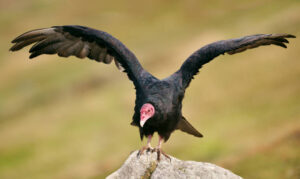
Walking my little grand-dog on April 3, I saw Turkey Vultures playing in the sky. My neighbor said he first noticed them on April 1 and counted forty-something of them the day before. He previously told me their exact arrival date in the spring and departure in the fall. Maybe they contribute to the saying, “Creatures of habit.”
The vultures are ugly with their featherless red heads, and they are a true menace to people living around the old telephone tower, but they are fun to watch. In-flight, their five-foot wingspan is V-shaped, and with little flapping of their wings, they effortlessly soar as they ride the thermal currents to great heights where they hunt for carrions.
I searched Google and found the classification for Turkey Vultures and all birds to be living dinosaurs. They can travel hundreds of miles a day, adapting well to urban areas due to abundant roadkill and excellent thermal rising from paved highways.
I also learned they defecate on their legs for protection against infection and vomit when in danger. They have very high stomach acid, which helps them digest their diet of choice. A YouTube video said their excretions have an extremely nasty odor, making sense when thinking of their digestive acid and their breakfast, lunch, and dinner. In the world of vultures, they are picky eaters as they don’t eat anything over four days dead.
You might be wondering what Turkey Vultures soaring above us and gathering each morning and evening on the telephone tower for their social fix have to do with mental health.
Here are my thoughts:
They spark curiosity, and learning something new is a valuable mental health tip.
They help us look up and see the broad sky which lifts us above our tiny world.
They teach us food is the culprit for bad scents coming from our bodies—the saying, “We are what we eat,” could be true.
They have a purpose and work hard every day. Even if our physical work is limited, mental exercise has many benefits.
They have a solid and consistent social system—we need the same—isolation decreases mental wellness—socializing helps us live above a five on a scale of one to ten, with ten being impossible and one being dead.
Even though they are not the prettiest or most handsome birds, they still contribute value—how we look does not define us or prevent us from having healthy thoughts.
They are a necessary part of nature, as we all are, and they show us that waking up each day and doing our best selves, what comes naturally, is the secret in plain sight.
Until the next time: Live while you live.
Powered by WPeMatico